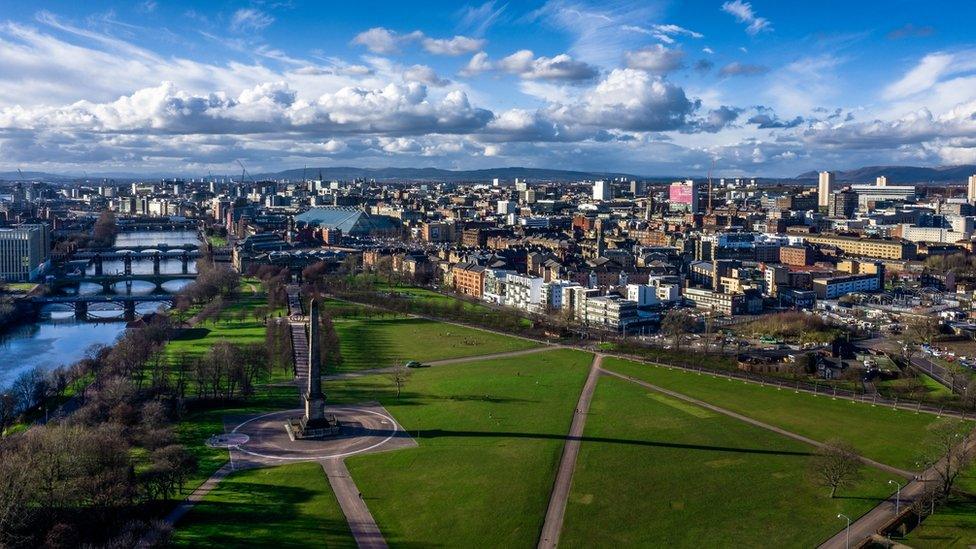Covid in Scotland: How can you watch Euro 2020 safely?
- Published
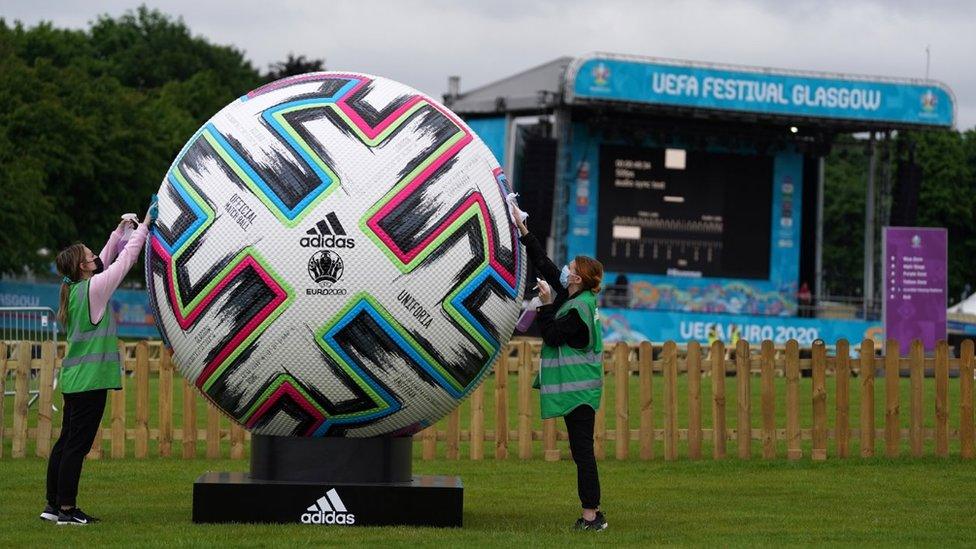
As the Euro 2020 tournament kicks off - a year late because of the pandemic - football fans across Scotland are preparing to watch 24 teams take part in 51 games, including the national team.
Scotland's first game of the month-long tournament will take place on Monday.
So, how can you watch the games safely, given that we're still living through a pandemic?
With Glasgow one of 11 cities across Europe hosting games, there are a number of places supporters can watch the games, and BBC Scotland has been looking into what the rules are at each.
At the stadium
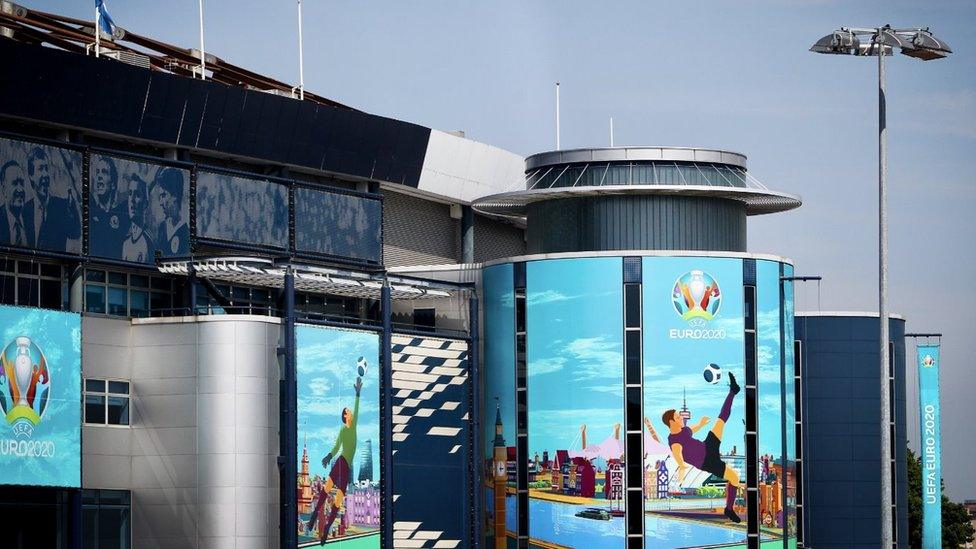
12,000 fans will gather in Hampden Park for four matches this month
About 12,000 fans will gather in Hampden Park for four matches this month, taking the national stadium to 25% capacity.
They include the Scotland v Czech Republic game on 14 June and the Scotland v Croatia match on 22 June.
Fans will be spread across the whole stadium, with 1.5m distancing between them.
Supporters have been sent e-tickets which include allocated times to arrive over a three-hour period, to avoid crowding at the turnstiles.
Mask-wearing will be expected at all times and over 800 hand sanitising stations will be available.
Those who are exempt from wearing a mask will be asked to show a doctor's certificate to prove this.
Food kiosks will be closed, again to avoid queuing, but fans are allowed to bring snacks in. Some, though, have complained that they will have to wait so long inside the stadium with no amenities open.
They will also have to stay in their seats at half time.
Wembley Stadium in London, which will host eight matches including the semi-final and final, will also operate at 25% capacity.
But the 22,000 ticketholders attending each game will have to show proof of vaccination or a negative Covid test.
At Hampden, organisers say there is no requirement for testing, external but they recommend that supporters who have not been fully vaccinated take a lateral flow tests before entering the stadium.

'Quarantine is the biggest problem of all'

Antun Oršolić (third from the left) and his friends follow Croatia around the world but are still unsure if they will come to Glasgow due to quarantine rules
Antun Oršolić, 37, has booked to travel from his home in Croatia to Glasgow for the tournament.
But he says, right now, he doesn't know whether he will come.
The two games he has tickets for will take place while he would be in quarantine.
He told BBC Scotland: "If we enter the UK, we have to go in to quarantine and that is the biggest problem of all.
"There are no problems getting tested - we get tested regularly.
"I've had two doses of the Pfizer vaccine and I didn't need to get it this soon but I arranged it so I could travel for the Euros. So did all of my friends who are due to travel with me."
It seemed to him that a "common sense" option would be for fans who could prove they had received two doses of the vaccine and who had tested negative for the virus to be allowed to go to the match.
But the Scottish government said fans travelling from an amber list country must stick to the rules on testing and quarantine, and that travel restrictions were in place to limit importation of the virus and dangerous variants.

At the fan zone
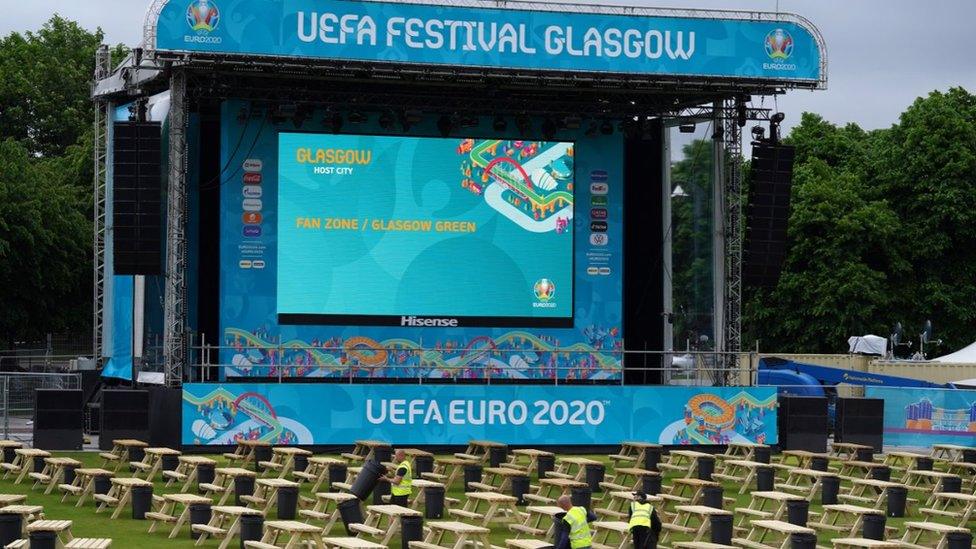
Up to 6,000 ticketholders a day will be able to watch games on big screens in the fan zones at Glasgow Green over the 31 days of the tournament.
A total of 3,000 people will be able to attend an afternoon session and another 3,000 an evening session in the "largely seated" venue which will be subject to Covid rules, external.
However, the Scottish government - who approved plans for the fan zone - has stressed that in "normal" times Glasgow Green had a capacity of 81,000 people, and that the site would be "highly regulated" so it was "low risk".
The site has been split into two areas, a family picnic zone and a food and drinks area.
In the food and drink area, tables seating six will be allocated to ticketholders. The tables have been placed 2m apart in line with social-distancing requirements.
And alcohol will be served - but this will be strictly table service only to avoid people queueing at bars. Spirits will not be served on a match day.
Spectators will also have to complete Test and Protect information, and wear masks when moving around Glasgow Green.
There have been calls from public health experts to make testing mandatory ahead of spectators visiting the fan zone.
And some hospitality businesses have expressed anger that the fan zone is going ahead in the city, despite rising Covid cases.
Bosses fear that the event could lead to more cases which could mean a return to tougher rules - and undoubtedly a further impact on their struggling businesses, which have endured some of the strictest restrictions in the country.
Members of the public have also said they are frustrated that so many people will be allowed to congregate while other gatherings - like weddings and other life events - are still subject to such strict curbs.
But the Scottish government has defended its decision to allow the fan zone to go ahead.
On the issue of not requiring mandatory testing, it says that everyone is being "encouraged" to make "regular use of lateral flow tests", and that organisers would be "reinforcing" that message to fans in advance of them attending the fan zone.
Health Secretary Humza Yousaf said there were issues around mandatory testing, for example some people were unable to take tests due to medical conditions or disabilities, as well as ethical issues.
He also raised the issue of "digital exclusion" affecting some fans who do not have access to the internet or a mobile phone, who would not be able to present a text or email that confirms a negative test.
Anyone can order lateral flow tests free online, external, for delivery to your home.
A Uefa Euro 2020 Glasgow Host City spokeswoman said extensive planning had taken place with a programme of measures implemented to ensure safety.
She added that the fan zone provided an opportunity for supporters to gather safely in a controlled environment.
In the pub
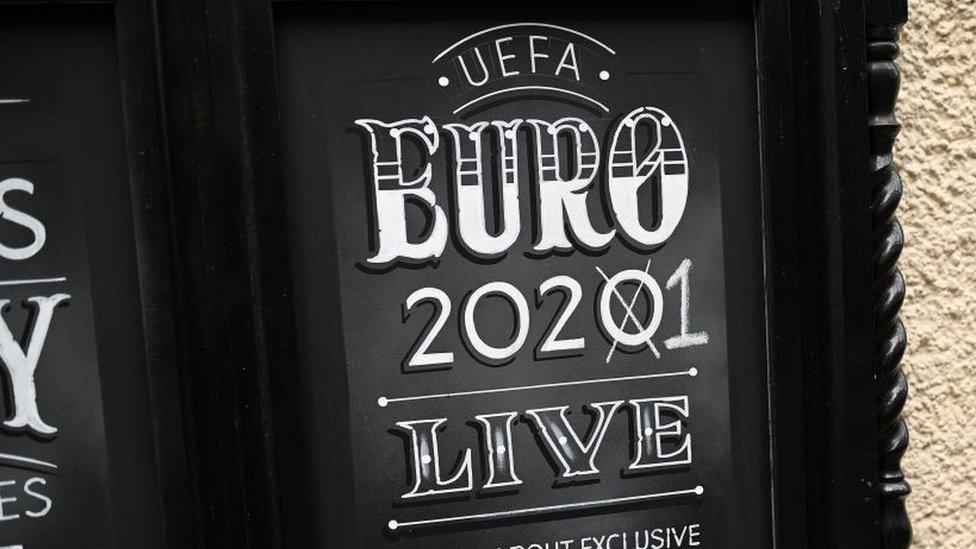
All the current restrictions on hospitality will stand, with a few extra considerations that publicans will have to make.
The current restrictions on maximum numbers and taking contact details for Test and Protect will apply.
But official guidance for venues, external says that football can result in heightened emotions, and that customers must continue to comply with hospitality rules - which means leaving seats and standing in front of TVs, shouting and singing, and not observing social-distancing are not allowed.
The guidance also asks pub owners to "think carefully about where TV screens are situated" to avoid congestion.
Fans watch Scotland's first ever football penalty shootout through the window of a closed pub
It also advises them to prevent screens being viewed from outside the premises by non-customers.
That's after Scotland fans were filmed crowded together celebrating outside a Glasgow pub while watching a penalty shootout through a window last year.
The pubs should also ensure the TV sound is at a low enough volume, external so that customers can "converse comfortably without significantly raising" their voices - as someone with Covid will spread more virus when they raise their voice.
Premises in level two areas have to offer two-hour, pre-booked slots (but this requirement does not apply in levels one and zero), so businesses are encouraged to schedule these slots around kick-off times to allow customers to see full matches.
The Scottish government acknowledged the challenges facing the hospitality sector at a time when it would normally be welcoming extra customers.
A spokeswoman said: "No-one wants the current restrictions in place a moment longer than necessary, but the evidence shows that the virus is transmitted between households, particularly in environments with close contact at less than two metres and where ventilation may be poorer.
"We are keeping all measures relating to the Euros under review and will continue to engage with the hospitality industry about any changes that may be necessary."
At home
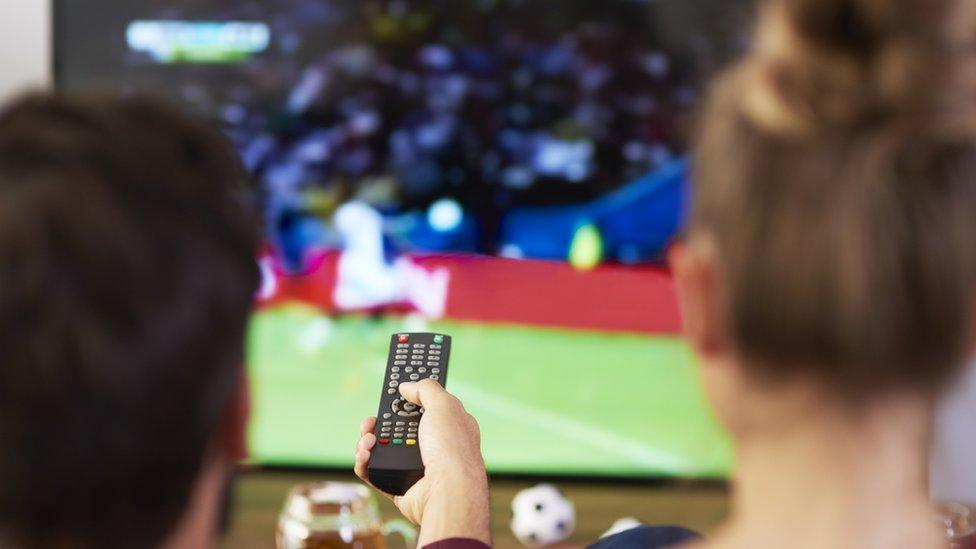
The rules for watching the game at home are the same as any other indoor socialising you might do in your home.
Everywhere in Scotland is currently in level two or below.
The rules for indoor socialising in level one, external or two, external are you can meet socially in groups of up to six people from three households in your home or theirs.
In level zero, external, of up to eight people from four households can meet inside.
You can check which level of restrictions apply in your area here, external.
Indoors, children under 12 do not count towards the total number of people meeting, but they do count towards the number of households.
You do not need to physically distance from family and friends in a private home, and you can travel anywhere in Scotland.


Do you have a question about the Covid restrictions in place in Scotland? Use the form below to send us your questions and we could be in touch.
In some cases your question will be published, displaying your name, age and location as you provide it, unless you state otherwise. Your contact details will never be published. Please ensure you have read the terms and conditions.
If you are reading this page on the BBC News app, you will need to visit the mobile version of the BBC website to submit your question on this topic.
Related topics
- Published4 June 2021
